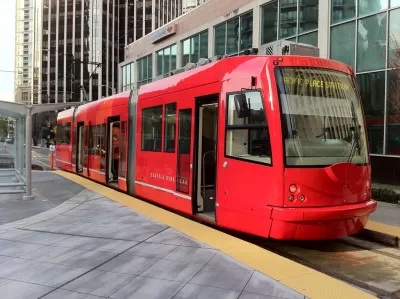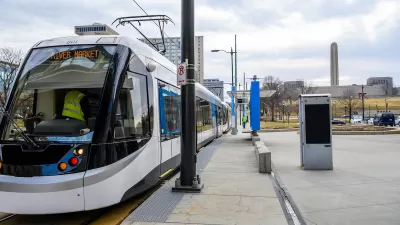While they're currently in vogue, streetcars are only worthwhile if they can be a viable option for local residents. Unfortunately, this is rarely how the systems are designed.

Streetcars, once a common feature in American cities, are on their way back. "The recent efforts of cities across the United States to build streetcar lines running through their downtowns have been heralded by some as an ideal amalgam—an investment in improved transportation that also leads to adjacent private development."
In a piece for Urban Land Magazine, Yonah Freemark criticizes existing streetcar systems for appealing to tourists rather than local residents. According to Freemark, there is no clear indication that installing sluggish streetcars actually drives economic growth.
From the article: "The focus on streetcars is reminiscent of the economic development strategies urban planners previously used in attempting to spruce up their downtowns, like pedestrian malls in the 1960s, festival marketplaces in the 1970s, and convention centers in the 1980s, none of which was particularly successful in reviving any downtown."
Freemark argues that a good streetcar system serves local needs, and does not serve as a downtown take on the Disneyland monorail. "The biggest problem is that they are typically too slow to be useful for most people [...] In the illustrative case of the recently opened Atlanta Streetcar, these conditions mean that the vehicles roll down the street at a measly six miles per hour (9.7 kmph). And that's once passengers have made it on board."
FULL STORY: Transportation First, then Economic Development for Streetcars

Maui's Vacation Rental Debate Turns Ugly
Verbal attacks, misinformation campaigns and fistfights plague a high-stakes debate to convert thousands of vacation rentals into long-term housing.

Planetizen Federal Action Tracker
A weekly monitor of how Trump’s orders and actions are impacting planners and planning in America.

San Francisco Suspends Traffic Calming Amidst Record Deaths
Citing “a challenging fiscal landscape,” the city will cease the program on the heels of 42 traffic deaths, including 24 pedestrians.

Defunct Pittsburgh Power Plant to Become Residential Tower
A decommissioned steam heat plant will be redeveloped into almost 100 affordable housing units.

Trump Prompts Restructuring of Transportation Research Board in “Unprecedented Overreach”
The TRB has eliminated more than half of its committees including those focused on climate, equity, and cities.

Amtrak Rolls Out New Orleans to Alabama “Mardi Gras” Train
The new service will operate morning and evening departures between Mobile and New Orleans.
Urban Design for Planners 1: Software Tools
This six-course series explores essential urban design concepts using open source software and equips planners with the tools they need to participate fully in the urban design process.
Planning for Universal Design
Learn the tools for implementing Universal Design in planning regulations.
Heyer Gruel & Associates PA
JM Goldson LLC
Custer County Colorado
City of Camden Redevelopment Agency
City of Astoria
Transportation Research & Education Center (TREC) at Portland State University
Jefferson Parish Government
Camden Redevelopment Agency
City of Claremont




























